Zelda: Breath of the Wild’s Musical Rebellion
The Legend of Zelda is a franchise that sells adventures. From charging into battle on horseback, scaling massive mountains, avoiding traps and solving puzzles in ruined temples, Zelda has you play through epic stories. The series’ recent entry, Breath of the Wild does this, but in a way that was so bold it has permanently changed the Zelda series.
Breath of the Wild goes slow. Very slow.
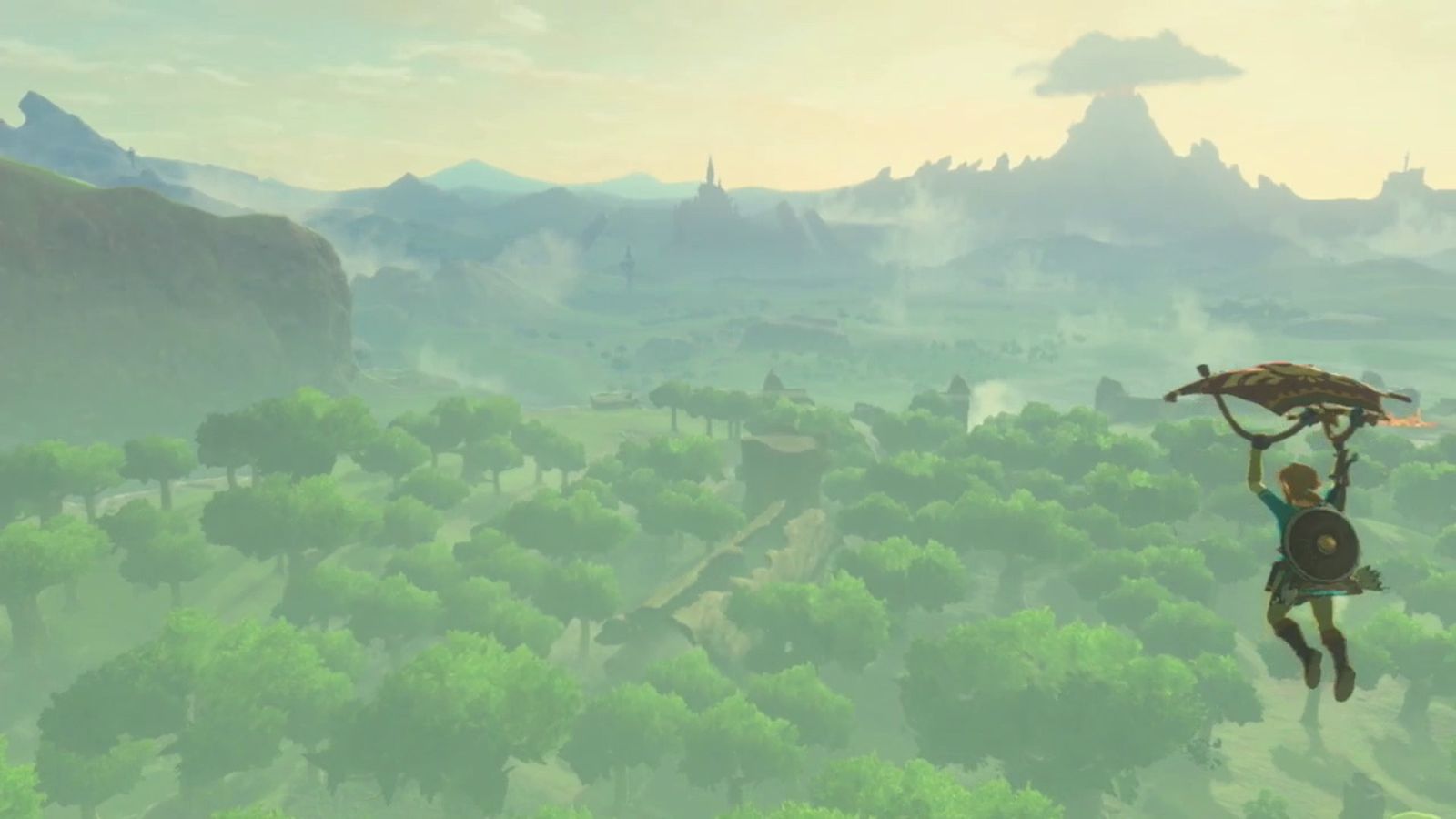
It is a game about taking your time, exploring tiny out-of-the-way places in its massive world. While the maps of other Zelda games were filled with towns and monsters, playing Breath of the Wild (BotW) means spending a lot of time in empty fields. Crossing the map may take hours, a timeline which gets longer when you consider the “stop to smell the roses” mentality the game presents. Small collectibles hidden in the environment give you motivation to watch your surroundings. Most of the games’ puzzles are hidden in shrines, and when your shrine-radar lets you know one is nearby you will start wandering around to find it. The game designpreys on your curiosity, because exploration is what is fun about the game.
Of course, players are not forced to do this. The game just makes it tempting. BotW infamously allows players to fight the final boss after only a short 15 minute tutorial. But the design leads players to explore the world, using tricks such as having few roads which run directly between objectives, spacing out towns to create empty pockets of nature between them, or having breakable weapons so that you have to search for replacements. Yet perhaps the most intriguing, and the most subtle, element of the game that makes you explore is the soundtrack.
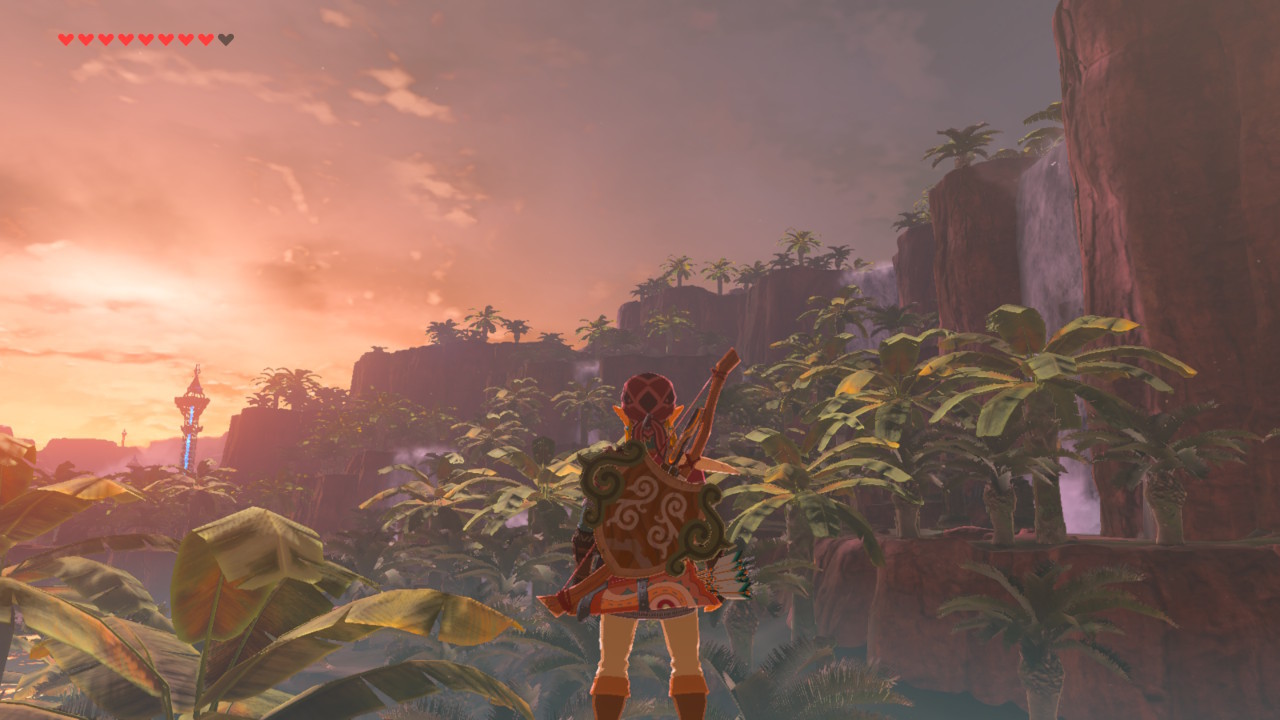
In 2011, a Zelda game called Skyward Sword was released, and a large part of its marketing was that it was the first Zelda game which used a full live orchestra for its soundtrack. Skyward Sword pulled you into its story with emotionally moving music, using the full range of its orchestration to get your blood pumping at the right moment for a boss fight, or conjuring tears when your companion says a final goodbye. This was all part of the design philosophy of Skyward Sword. It was a game about embarking on an epic adventure, full of cinematic moments. Which is why the orchestra worked: it felt cinematic, like the soundtrack could have been ripped from a film. Skyward Sword also had a rather linear story, prescribing a plot arc for the player to take alongside the protagonist, and using the music to steer them along.
BotW would rather the player found their own story as they explore the world. Just when the auditory ambition of the Zelda series was peaking with soundtracks packed full of many instruments as could fit in an orchestra, BotW said “No.” The soundtrack went from a concert hall to a lone musician sitting at a piano soaked in a spotlight.
It is surprisingly, and refreshingly, challenging to find songs on BotW’s soundtrack which use more than one instrument. Most of the game’s musical design means you hear a tinkling piano drifting to you on the wind, and nothing else.
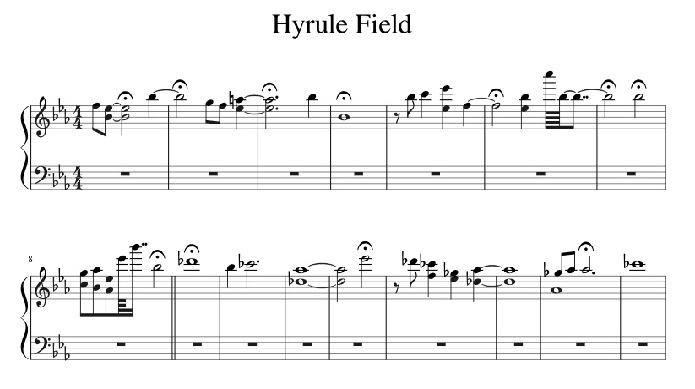
Clearly this is an unconventional soundtrack, but the actual theory is even odder. Looking at the sheet music, songs are made of fragments of notes. For instance, in the song Hyrule Field, fermatas dot the page. While the song still progresses in order, the length between fragments is variable. And while composer Manaka Kataoka never uses more notes than are absolutely necessary, what he does use is enough to set the song up. The first two notes establish the song’s key (E♭ Major) by playing the root tone (E♭) and its fifth (B♭), a core interval which defines the key. The root shows up occasionally to ground the song, but never frequently enough to give the resolution other Zelda music has. Previous games wanted a heroic piece which made the player feel comfortable. BotW wants players looking ahead at the next thing to explore, to foster a curiosity. Thus the strange use of the root, in which the song briefly resolves a melodic fragment before almost always proceeding to a different note to end that fragment on. The song keeps taking one more step than it should, leaving the player off-balance, but eager to take the second step, kickstarting their wandering with the song pushing them along.
Most songs rely on organized musical phrases to define verses and choruses, and with clear tonal resolutions to demarcate the end of each. BotW manages to string the player along a series of fragmented phrases. The lack of resolution keeps the song’s momentum going, so fragments chain together into something which is still not a melody, but a cohesive song all the same. For example, later sections of Hyrule Field include randomized elements where fragments can swap places upon repetition, but the song is composed such that they can interchange seamlessly, creating the same tonal effect in either place while disrupting the repetition for the player.
But this is not even the boldest part of the sound design. When was the last time you heard silence? Real, heavy silence. It is rare, especially in our urban world. One would have to wander out into the middle of nature to get real silence. Which is precisely where BotW is set.
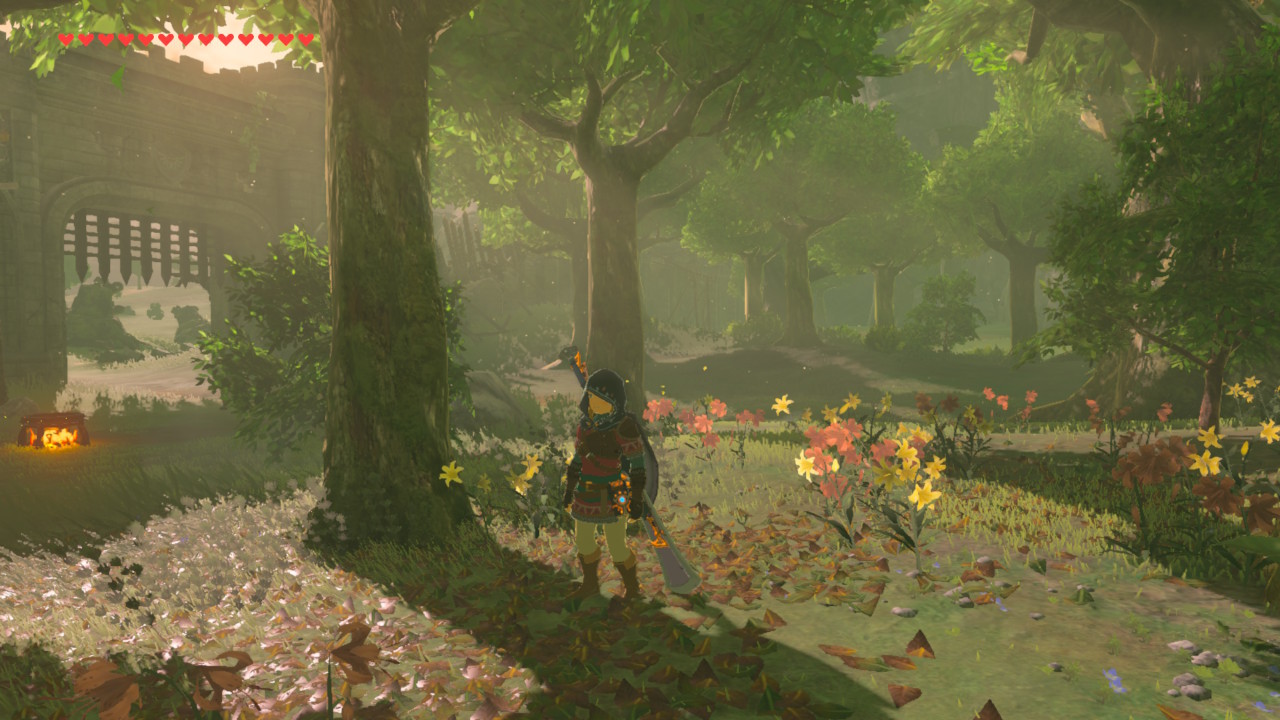
The majority of the time you spend exploring BotW’s world will be accompanied by no music whatsoever. The fragments of piano are only occasionally heard. Of course, you are exploring the wild. Nature is never silent. So when the piano is quiet, the world around you is roaring with natural sounds. Birds trill, wind hisses, water gurgles, rocks creak, animals grunt, rain chimes, monsters cry, everything has a sound. When the piano pipes up it melts right into the natural soundtrack. It is immersive, in a way something like Skyward Sword’s orchestra could never be.
How does this affect the experience of playing? For one, you never feel like an intruder in the world. The protagonist is a piece of nature, and so as you explore nature you feel that you are doing so from within. The piano fragments appear when you round a corner or cross a bridge, so they are always tied to your actions. Thus the piano becomes a musical motif for the protagonist, your part of the soundtrack. Even though you know it is not, it feels diegetic. And you feel integrated in the world.
As the game asks you to interact with its world in the exploration-driven gameplay, the music connects the player to that world. However, these also overlap. It is because the soundtrack is not a booming, adventurous riding song that you can hear an owl’s hoot. And the second the player turns the camera to try to spot that owl, they have turned their eyes away from the road and the objective they were heading toward, lured into watching the world and inevitably spotting a secret to uncover. To give another example of the music mixing with the world, the song On Horse, played while on horseback, has no percussion instruments, and no steady repeated beat to compensate for that lack. Instead, the hoofbeats of your horse synchronize with the song to fill the percussive role. It is a simple thing, but a very confident piece of game design. BotW understands its players very well and knows that at its core, an adventure is an exploration. Exploring a world is more than just moving in a three-dimensional space; auditory sensations are an integral part of a world’s specific flavour, and makes it feel genuine. Sheer silence would be uncanny, but silence broken up by natural white noise makes sense.
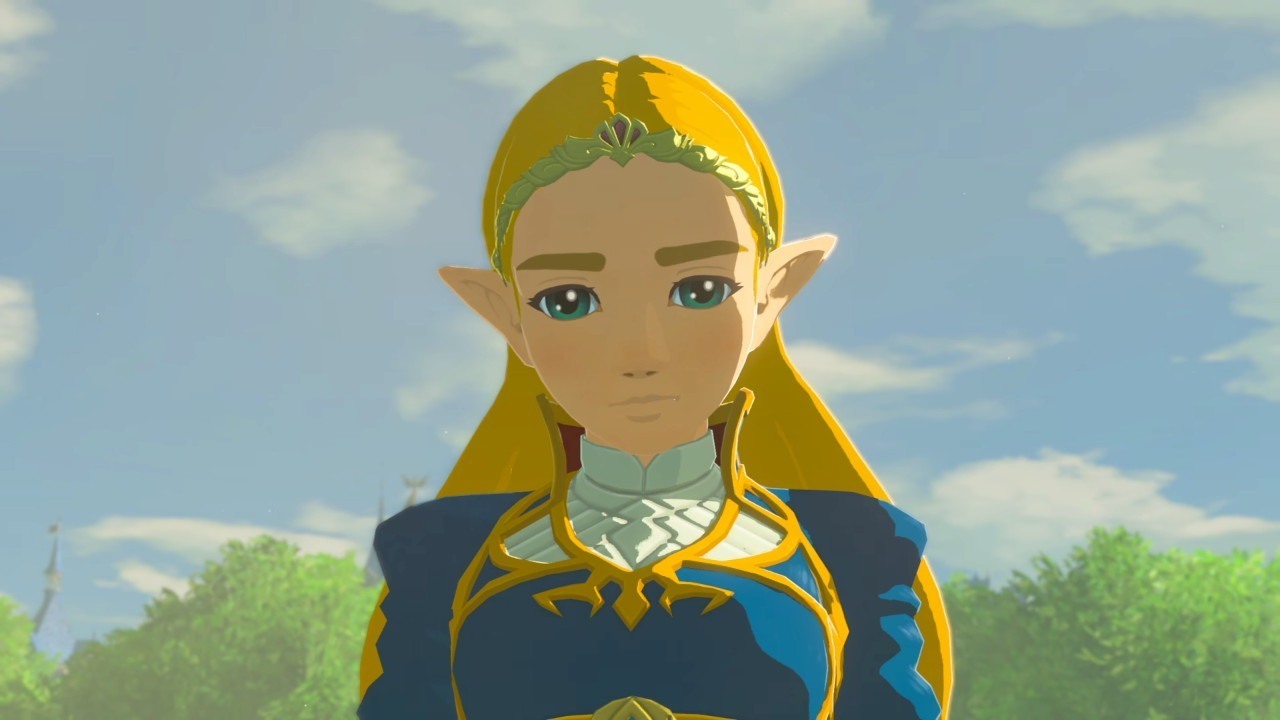
It was a risk. But BotW took it, and it paid off. Zelda abruptly evolved from sweeping symphonic soundtracks to a few small scattered smatterings of piano parts. While there are no vocal parts, the music is complemented by the nature’s voice, adding its own sounds. And while some players hate it, and some love it, the soundtrack has hit hard enough that what people call the sound of a Zelda game, the sound of an adventure, has changed forever.
What do you think? Leave a comment.




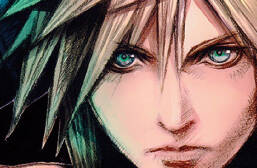






This is a well written article! I agree that the soundtrack of Breath of the Wild was a risk, but it was refreshing in many ways. The use of nature sounds as part of the soundscape was very effective in a game about a massive, wild world. The score still had some epic moments and tributes to previous Zelda games, but the score feels like a new musical approach for a new era of Zelda.
The music in BOTW was so beautifully underdone. The Zelda franchise has always incorporated musical elements directly into the gameplay through classic musical stings and even character-driven musical plot elements. I’ll never forget trying to map out the N64 button musical staff during the Ocarina of Time.
I like the detail you provide here. The music in the game is so iconic, but I remember getting a hold of the sheet music and going “huh?”. How they managed to get so many iconic musical themes with such a non-traditional musical approach is beyond me.
The incredible bravery in throwing away the typical Zelda tropes and playing with something so ambient and sparse is hard to overstate.
Never miss the point of the sparse composition. Yeah it’s not the great listening to it as a standalone piece of music but when you’re exploring Hyrule and all you can hear is this song and the sounds of nature you realize why it was composed this way. Also, a more bombastic soundtrack would’ve become grating while exploring the world for hours on end. Simply put, this piece isn’t meant to be listened to by itself. Rather it must be experienced along with the game to truly appreciate.
It never occurred to me that this was a coherent piece of music. I figured there were a dozen different fragments and the game played one at random every so often, like ambience in Minecraft. Cool idea, but for me the extreme presentation took away from the effect.
Masterpiece of a game.
Nothing special, memorable or classic about this soundtrack. Forgettable melodies, with no rhythm. The game was awesome though.
Some people don’t like it because they wanted a theme for link. Not the theme of wind blowing the the grass. Instead of the typical adventure feeling the music wants you to take a breath and experience the environment.
A thing I noticed when listening to hyrule theme on its own (as opposed to within the game) was that I kept expecting other noises to pop up, and they didn’t- obviously, those were sound effects from things happening within the game (birds, monsters, footsteps, etc). I didn’t realize at first, but this theme was encouraging me to pay closer attention to the world around me, and listen to the surrounding environment so closely that those sound effects themselves feel like a part of the soundtrack.
It’s a perfect encapsulation of what 100 years of destruction and desolation has done to Hyrule. It’s quiet….too quiet…which kinda puts you on edge, knowing full well as you walk on, you might stumble across a Guardian waiting to blast your ass back to Kingdom Come.
It allows the atmosphere to breathe as you take in the sights around.
BotW was well made from the standpoint of gameplay mechanics and visuals but I hated the decisions made for narrative and characters. I know we’re outside of the scope of what we are discussing on this article but if you’re going to do a world like this, I would rather have had a game where Link has speaking lines and a character arc that we can follow and more believable characters when it comes to the Champions you meet. Also voice actor choices for Revali, Daruk and the Deku Tree really annoyed me. I thought Zelda’s voice actress was good and Urbosa’s was phenomenal. Wasn’t super satisfied with the way the plot wrapped up either.
It is appropriate that BotW’s theme is so sparse, has so much empty space… just like the game. There’s mood, it’s something you can appreciate, but it’s more of an artistic interest than it is something exciting. Which I think is a perfect representation of the game itself. Most of my time with BotW felt like I was just chilling, doing stuff to kill time and make some sort of progress toward one little side thing or another… which is very in keeping with Ubisoft-style open world games.
But it’s sort of sad to see Zelda become another open world game, adopt the same sort of systemic/repetitive design, and have the same sort of forgettable atmospheric music throughout that so many games have now. It’s been a while since I played it, but I think there were a few rare instances where there’d be a recognizable piece of music pop up that wasn’t so skeletal, and wispy. But I couldn’t say for certain, not off the top of my head.
It would have been sort of cool if BotW stole from Red Dead Redemption and after so long just having sparse bits of barely-there music, it had a moment in the game when all of a sudden the full theme rose up and soared, dramatically, as you headed to your confrontation with Ganon or something. But you can just fast travel there if you’ve unlocked it earlier so that’s not likely.
I think the score to this game is brilliant. There are little pieces of other songs from the game in the overworld theme and that’s smart because Hyrule has fallen. There is no overworld theme because there is no overworld, just scattered remnants of it, and that can be said for the music too.
Very interesting article. I’ve been playing Zelda games for years, and when BotW came out I actually bought a Nintendo Switch just to play it. But I was disappointed with the game itself, and I think it’s precisely because I was expecting a more story-driven, fully orchestrated game like previous titles. Don’t get me wrong, I had fun freeing the Divine Beasts and eventually defeating Ganon, a task which naturally took a long time. But while I congratulate the Zelda series for innovating in order to introduce something fresh into its formula, it deviated too much from why I enjoy Zelda in the first place to be palatable to me, much less deserving of the constant “Best Game of All Time” accolades the Internet community piled on it. Weapons that break (even the Master Sword becomes temporarily unusable after too many swings, really?), essentially no large scale and memorable dungeons, a “find the plot for yourself!” motivation, and of course the music… I’m sure I’m in the minority, but it just wasn’t for me. I think the music is a big part of why people have enjoyed the series so much (how many different covers on YouTube are there of the Zelda theme or any song played on an ocarina?). I like your theory of why the developers chose to go this route to fit with the theme of this game, and it certainly fits. But people keep older games alive in their heads in large part due to the music, and I find it hard to believe that BotW will maintain the same level of long-lasting popularity as Ocarina or Majoria’s Mask, or even Skyward Sword or Twilight Princess at least in part BECAUSE of the lack of that substantial musical element.
I actually love compositions like this when it comes to atmosphere, I seem to remember a couple games where interacting with the interface triggered these elements. I think Brink’s revive screen had something like that, but also some kind of abstract metro building game, iirc
It Sounds Huge and Gentle! Like dew drops on a spider web and insects taking off at the sunrise. The high notes put you in mind of a nature themed Children’s story. The long notes and spacing gives a ton of space and distance to the mental image it paints, like echoes.
I loved the soundtrack of BoTW. It felt almost Ghibli-esque, and I got a lot of nostalgia from the music.
I think breath of the wild was wickedly overhyped. And as a long time Zelda fan, I feel very left down. This theme was just one of the many ways I feel cheated
Most people who would criticize this music are probably used to listening to Zelda music outside the game (say, on YouTube). But most BotW music just isn’t meant to be listened to outside the game. Heck, you could argue that some of it isn’t really meant to be listened to, consciously, even as you’re playing. Much like the game itself, the soundtrack is a very different approach to video game music from the rest of the series, and it works beautifully. And for anyone who wants the meaty music to really dig into, Kataoka proves she’s got the chops there too with some tracks like the Hyrule Castle theme!
I never realized how calm the music is. I am so used to hearing the ambient noises in the game the music by itself sounds almost weird.
The space in the music for me reflects the space of the world in the game. It feels very purposeful. When the new sounds hit my ears it is reminiscent of being a child discovering a new berry in a bush, a new leaf on a new tree in a new yard, park, or forest. It is curious like tasting a new taste, smelling a new smell, seeing a new sight. It is like discovering things for the first time.
I like seeing Zelda experiment. I understand why people are upset that there aren’t many hit jams like past games but I think the atmosphere the soundtrack makes is incredibly unique and special. It’s always good to see them out in top effort no matter what type of music they aim for.
I started playing Breath of the Wild (earlier this year: still haven’t beaten it) just after coming to understand and appreciate weirder musics and more complex harmonies (just the right time). I don’t think I’d’ve appreciated BotW’s overworld theme if I hadn’t come to understand 20th century musics like impressionism or serialism (the whole tone scale too. lol ). Even just an appreciation for the lush harmonies of modern jazz/bebop/fusion can lead to a person’s better understanding of this soundtrack (namely the overworld themes).
Another thing that helps is having played Xenoblade X. lol I actually haven’t played Xenoblade X yet, but I’ve heard that the constant music, though fantastic on it’s own, can get annoying in such a gigantic world. A younger me would’ve wanted an orchestral version of the original Zelda theme playing at all times, but now that I’ve matured (in musical taste too. lol ) I can easily see that the exciting harmonic movement and epic instrumentation of a traditional Zelda overworld theme would’ve quickly clashed with the pacing and atmosphere of the new giant overworld. This new harmonic stillness and aural spaciousness is the perfect compliment to (and musical representation of) the overworld in BotW, even if most fans don’t understand it.
I absolutely love the minimalist soundtrack for the Overworld, it really creates a sense of exploration and loneliness which sets the tone for the game. It doesn’t burn you with unnecessary sounds and allows you to enjoy the ambient noise that makes the game so enjoyable.
The music is so broken and ambient. . just like the broken world.
The impression I get from the article is that the open-ended nature of the game allows the player to decide his own game. In other words: the player serves as the descantor.
One of the best videogame I ever played. OST is genius
Hmmm, why am I reading this article? Love the sound of adventure and nature
Your take really opened my eyes on this. I remember booting up BoTW for the first time so excited and binging really shocked by the silence and the subtle music. At first I really didn’t like it, I missed what Nintendo had done with the rest of the Zelda franchise, the iconic tunes and lines that can get stuck in your head. But it’s true that the minimalistic approach matched the game better because it was more geared towards pulling you into Hyrule. And it succeeded. The graphics and the music created a landscape of realistic animated art that fulfills our childlike fantasies. Bravo Nintendo. You did it again.
Although I was disappointed in BotW’s sparse soundtrack, I can now appreciate this theme. It embodies the open-world game play in the way it makes you focus on every single note- similar to the way you now pay attention to each little patch of grass or tree. Instead of previous games, where you practically gallop through both the song and the overworld; this game is about stopping to appreciate the little things.
Two things I love, music and video games. Thank you. 😀
Every time i hear anything from this soundtrack my eyes brim over with tears (for personal reasons). Absolutely amazing.
The music especially the embellished versions has always sounded like green dolphin street to me (especially bill evans’s kind of blue version intro). It helps that it’s in the same key and uses the same type of modal interchange
The music does fit the game well. While playing, however, I rarely played with sound on. Due to this being a handheld game and playing in spaces where it would have been inappropriate, but also because I usually didn’t feel compelled to hear the soundtrack, in the way i felt compelled in other Zelda games.
This game sets the standard for any open-world games going forward. Such a marvelous execution of environment, sound, and gameplay.
i think botw soundtrack – both the minimalist and non minimalist pieces – is amazing.
i’m amazed people apparently disliked this game’s soundtrack. it’s probably my favorite in the series.
As someone who appreciates music theory bit hasn’t grasped all the how/why, it’s wonderful to hear it for my favorite games. Keep it up!
I get what they were going for but I still prefer the more bombastic music from previous Zelda games. Those soundtracks just sound a lot more varied and exciting to me.
Every single song in this soundtrack was made so meticulously. I love how there isn’t a single piece in it that doesn’t seem to serve a purpose. It’s lush and beautiful, just like the game
That’s how it should be.
This is a great look at how games can influence players in ways they don’t expect.
This is a really important lesson to learn about vision in game design. Every single piece of Breath of the Wild is oriented toward the idea of exploration, of discovery, and of a sort of true-to-life sense of adventure. If the game weren’t so big I could be convinced that it was designed by one person. It’s one of the first huge AAA titles to replicate the feeling that indie games have been making use of for the last decade: the feeling of authorship, the feeling that this piece of art was designed by a single mind. Everyone who designed this game was in sync, as you’ve pointed out so cleverly with this attention toward the music.
It really is remarkable.
I love BoTW’s soundtrack almost as much as I love the game itself. My favourite moment was hearing Zelda’s lullaby begin to play once in the place of Link’s theme in the Hyrule Castle track. Weaving these old, fan favourite melodies brings a sense of nostalgia that mirror’s Link’s quest to regain his memories. It fits the game’s concept perfectly.
Awesome
I feel that also if it weren’t for the music at all, I would have felt more intrigued to “stop and smell the flowers”. I seriously admire that about a Breath of the wild causing me to finish the story in just a week or two (it was summer).
Though I have not got the time to play any games in the past few years, I have fond memories of grades 7-9 when I used to be an avid gamer. Zelda was one of the titles that had kept me intrigued for many hours.
I love the interweaving between music and storytelling. Fabulously said!
I think it is facinating of how long the zelda games have been going on for approx 30- some years now.
Once again another great episode in the saga of Zelda. I have been playing Zelda for years but have really enjoyed how the games has progressed over the years.
Personally the soundtrack of BotW made it for me. It absolutely would not be the same game if they went for the usual, more bombastic Zelda score. I love playing in handheld mode and usually listen to some music while I play, but BotW just demands that I play it with the sound on, just to listen to the quiet ambience that sells the world and the atmosphere. Very good article.
This piece puts into words the thoughts I’ve had from playing Skyward Sword all the way back in 2011 to playing Breath of the Wild when it first came out. I find equal artistic merit in both soundtracks for wildly different reasons (and I try not to let nostalgia cloud my view as I was just a kid when SS came out so I attribute the soundtrack to the wholesome days of childhood), as they’re both going for a different feel and knock it out of the park respectively. Very well written piece, enjoyed reading it!
As someone who doesn’t know much about music composition, this article was very clear and easy to follow! The soundtrack in BotW always has a special place in my heart because of how uniquely beautiful it is. I suppose this ‘rebellion’ you mention can be attributed to the evolution of Zelda games into an open world genre rather than just a linear story. As an addendum to this, I’ve also noticed how the music changes during overworld combat-such as the clash of symbols with a successful parry or a burst of drums upon getting hit by an enemy. This article is going to jumpstart my BotW obsession again!